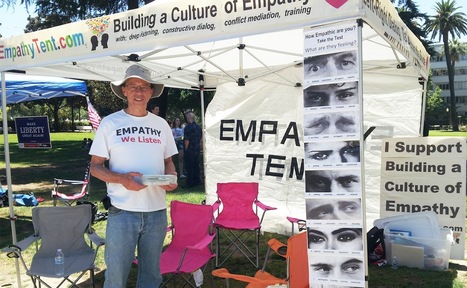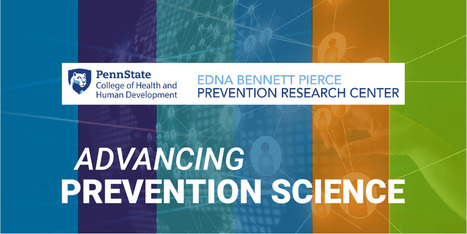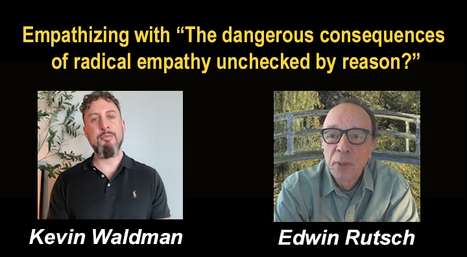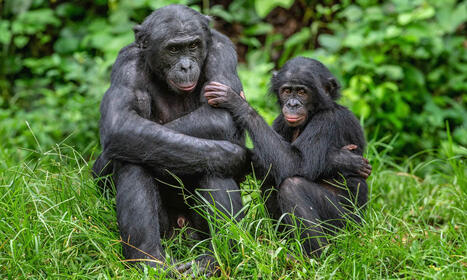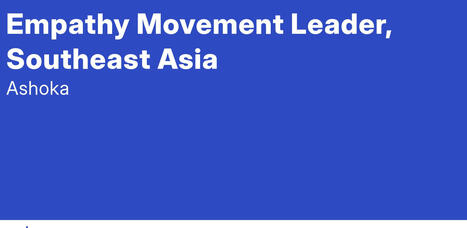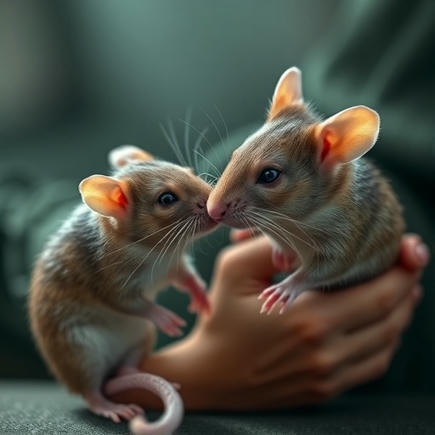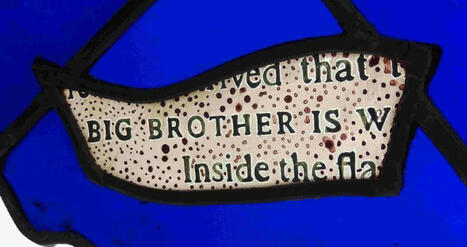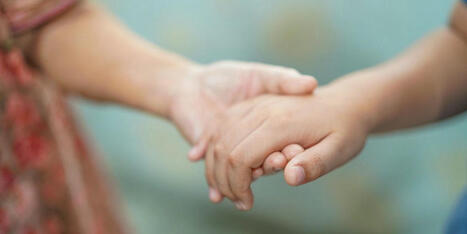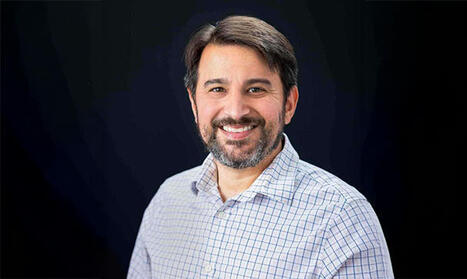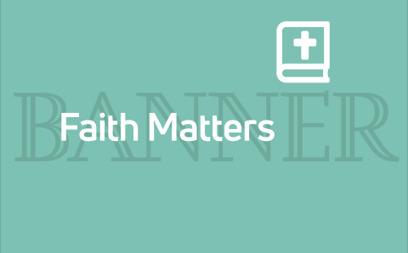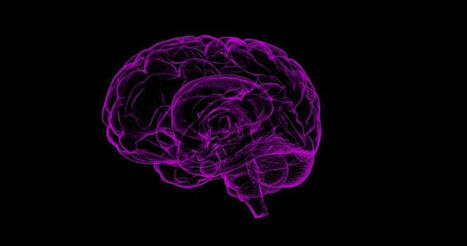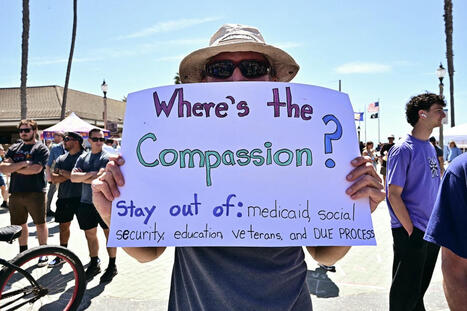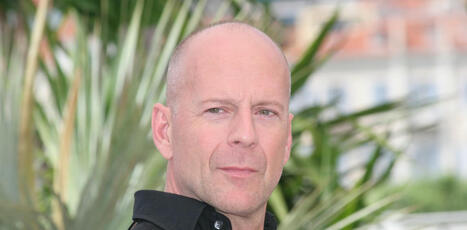 Your new post is loading...
 Your new post is loading...

|
Rescooped by
Edwin Rutsch
from Compassion
September 28, 2024 2:35 PM
|

|
Scooped by
Edwin Rutsch
May 1, 12:13 AM
|
We will be joined by Phillip Kanske (TU Dresden; Psychology and Neuroscience) and Leda Berio (Ruhr University Bochum; Philosophy). They will discuss the nature of empathy, each presenting talks on their work and then discussing interdisciplinary considerations about empathy with each other and the webinar audience.

|
Scooped by
Edwin Rutsch
April 30, 12:55 AM
|
"Empathy is the essence of our human connection. It is an essential part of healing – body, mind and spirit," said Maureen Sullivan, Vice President, Patient Experience & Service Excellence. “A little empathy goes a long way," said Jennifer Lastic, Director, Experience Excellence, Office of Patient Experience. "You never know what someone you encounter is experiencing, whether a patient or family that we serve or one of own cherished colleagues."

|
Scooped by
Edwin Rutsch
April 30, 12:50 AM
|
To further test the boundaries of rat empathy, researchers designed experiments pitting altruism against self-interest. In one particularly revealing study, rats were given a choice: they could either eat chocolate all by themselves or free a distressed companion and share the chocolate. Consistently, rats chose to free their companions first and then share the treats. This behavior persisted even when researchers modified the experiment to make helping more "costly"—requiring more effort or resulting in less reward for the helper. The rats' willingness to sacrifice immediate gratification to aid others challenges long-held assumptions about animal behavior being driven purely by self-interest. Some rats even demonstrated what appeared to be consolation behavior, staying close to the previously trapped rat and engaging in increased physical contact, similar to how humans might comfort someone in distress. These findings suggest that prosocial behavior—actions benefiting others—may be more deeply rooted in mammalian evolution than previously thought.

|
Scooped by
Edwin Rutsch
April 29, 7:27 PM
|
While the relationship between proven models of youth engaged empathy education leading to greater prosocial behaviours has been well established its actual implementation, across self, family, school, community and society has been not been given equal attention. This talk will focus on three core functions in this regard:
The essence of activated empathy and kindness by youth for others as an enabler of self-resilience and social support enlistment.
The links between empathy and positive youth development theory specifically to Lerner’s ‘5 Cs’ and as a mechanism for the development of better intergenerational relationships.
The importance of viewing positive youth development as part of the reciprocal socio-ecological systems from youth (micro) to society (chrono) will be explored.
Dr. Sean Campbell, CEO of Foróige, (Ireland’s leading and largest youth NGO) will share implementation models involving youth mentoring and youth leadership that have been developed, tested, and proven to work in Ireland.
The talk will also introduce the fledgling model of a UNESCO Empathy and Engaged Citizenship Observatory currently under design as a future framework for a better world for youth and civic society.

|
Scooped by
Edwin Rutsch
April 28, 8:14 PM
|
New research has provided insight into how bonobos and chimpanzees demonstrate empathy, challenging previous beliefs about their social behaviors. Scientists have long known that comforting distressed peers is a key marker of empathy; however, a direct comparison between these two ape species had never been conducted—until now.

|
Scooped by
Edwin Rutsch
April 28, 8:11 PM
|
This study examines how empathy influences the execution of the Army mission command philosophy. This timely discussion of empathy partly reveals how leaders can be better prepared to win in a future operating environment shaped by the complexity and speed of human interactions. Through the analysis of case-studies involving General Stanley McChrystal and Colonel Michael Steele, this thesis describes how each individuals empathetic mindset resulted in both favorable and unfavorable mission outcomes for their respective organizations. The results of the analysis point to the surprising and important ways that a leaders capacity for empathy impacts everything from shared understanding, team-building, and even accepting risk. This study concludes with a recommendation for an increased emphasis on empathy development within the Army and a list of suggested topics for future research.

|
Scooped by
Edwin Rutsch
April 28, 10:46 AM
|
Edwin Rutsch and Kevin Waldman discuss Kevin's article published in the Chicago Tribune and other newspapers entitled, "The dangerous consequences of radical empathy unchecked by reason." Kevin criticizes "radical empathy" on campuses as performative and harmful, emphasizing the need for genuine empathy that maintains critical assessment and reason. Edwin introduces his Wholistic Empathy definition model, which includes sensing into others' experiences, self-empathy, imaginative empathy and the level of overall empathy within a community. He advocates for making mutual empathy a primary social and political values. In the end, they agree on the importance of mutual empathy, listening and dialogue in fostering understanding and reducing extremism. Edwin proposes using empathy circles to facilitate empathic listening and dialogue, aiming to bridge political and social divides. Kevin plans to host Empathy Circles at his University to foster constructive dialogue.

|
Scooped by
Edwin Rutsch
April 26, 7:43 PM
|
By Sanjana Gajbhiye
Earth.com staff writer
Empathy is often seen as a defining human trait, woven into the fabric of our societies. It helps people cooperate, build friendships, and resolve conflicts. But empathy is not unique to humans. Across the animal kingdom, from elephants to the bonobos, behaviors hint at emotional connections that transcend species boundaries.

|
Scooped by
Edwin Rutsch
April 25, 5:19 PM
|
Senior author of the study, Professor Zanna Clay of Durham University’s Department of Psychology, added: “Although empathy is very important for our own species, our findings show that empathic behaviours, like consolation, appear to be a common trait we also share with our two closest ape relatives.
“Finding these overlaps between our two close cousins suggests our last common ancestor likely showed these empathic capacities too.
“A next step will be to see how much these patterns are also observed in other settings, particularly in the wild.”

|
Scooped by
Edwin Rutsch
April 25, 5:08 PM
|
Ashoka is unleashing demand for empathy as a 21st century skill. Our Global Empathy Initiative has mobilized a powerful group of social entrepreneurs (Ashoka Fellows), schools (Ashoka Changemaker Schools), media thought leaders, and other partners to drive a fundamental shift in children’s education and coming of age.
We are looking for an extraordinary entrepreneur to lead the Empathy initiative for Southeast Asia.
We have a powerful opportunity for an imaginative, collaborative entrepreneur. If you are an accomplished leader (from any field) who has built or grown an organization from early stages to large size, has built teams, believes in the power of networks, and are looking for the next big challenge, come join us.

|
Scooped by
Edwin Rutsch
April 24, 11:27 AM
|
Known colloquially as the “prosocial hormone,” oxytocin’s role extends into human neuroscience literature, where it has been implicated in fostering empathy, facilitating cooperation, and reinforcing social trust. However, this study pioneers the demonstration of oxytocin’s capacity to simultaneously modulate both affective and motor components of prosocial behavior through distinct neuroanatomical pathways in a non-primate mammal, underscoring conserved biological principles across evolutionary scales.
Beyond its immediate scientific implications, this discovery holds profound relevance for understanding the neurobiology of empathy and social connectedness. Philosophers, behavioral scientists, and evolutionary theorists have long grappled with the origins and significance of altruism. These new insights place the roots of helping behavior squarely within genetically and neurochemically encoded frameworks, suggesting that complex social emotions need not rely solely on higher cognitive processes but can emerge from hardwired circuits facilitating mutualistic interactions.

|
Scooped by
Edwin Rutsch
April 23, 4:51 PM
|
According to Elon Musk, “The fundamental weakness of Western civilization is empathy.”
When I read this in the Guardian, I almost fell out of my chair. Sadly, it gets worse! This heresy is not merely a hallucination emanating from Elon’s ketamine-fueled brain: It is gaining traction not only among evangelical Christians, “who have begun to recast the pangs of empathy that might complicate their support for Donald Trump” but also Catholics in the JD Vance mold.
|

|
Scooped by
Edwin Rutsch
May 1, 12:24 AM
|
What can stoicism teach us about empathy in modern life? This centuries-old philosophy can directly apply to what we face now in our workplaces and our world.
Shermin Kruse is here to talk to us about her latest book, Stoic Empathy. She shares what stoic empathy means and how the fusion of these seemingly opposing forces is particularly relevant today. She shares her personal story and how her immigrant journey shaped her understanding of empathy and stoicism. Sher also talks about how she leveraged stoic empathy as a lawyer to great success. We discuss practical tools for building influence and emotional regulation that you can start using today with your employees – or your partner or kids!
Whether you’re a corporate leader, educator, parent, or simply seeking tools to navigate personal and professional challenges with integrity, you will love this conversation!

|
Scooped by
Edwin Rutsch
April 30, 4:10 PM
|
The role of empathy goes far beyond storytelling, though. Margaret Mead, one of the world’s most distinguished anthropologists, supposedly said that the first sign of civilisation in an ancient culture was a healed femur. Not a tool, a clay pot, a figurine or a hunting weapon, but the longest bone in the human body.
How so? The fact that a femur healed meant someone stayed behind with the injured. Someone sacrificed their own safety by separating from a larger group and cared for the injured person. That’s empathy rewriting history, challenging the ‘survival of the fittest’.
Bottom line, empathy is the cornerstone of our civilisation. There’s a good reason lack of empathy signals several personality disorders such as narcissistic personality disorder, borderline personality disorder and psychopathy. Keep that in mind as you evaluate statements by the likes of Elon Musk about empathy being the fundamental weakness of Western civilisation.

|
Scooped by
Edwin Rutsch
April 30, 12:54 AM
|
The Empathic Leader: Integrating Nonviolent Communication Into Leadership
A 12-Week Immersive Training for Purpose-Driven Leaders
Empathy has emerged as the cornerstone of effective leadership in our complex world. While empathy is an innate human capacity, the skill of empathic communication and the ability to create collaborative relationships that honor everyone's needs requires deliberate practice and development.
The Empathic Leader is an intensive 4 month programme designed for purpose-driven leaders who want to integrate Nonviolent Communication principles into their leadership approach.

|
Scooped by
Edwin Rutsch
April 30, 12:49 AM
|
by Kenneth Hamner
Most of us grew up hearing about the golden rule: treat others as you would want to be treated. But today, in a country that feels more divided than ever, ' Empathy Under Fire From The Right More and more, voices on the right are not just questioning empathy. They are vilifying it as a threat to society itself. On Joe Rogan’s popular podcast, billionaire Elon Musk described empathy as a “bug” in the human moral system. He warned that Western civilization suffers from what he called “suicidal empathy,” where unchecked compassion undermines its ability to defend itself. This skepticism is not limited to the richest man on Earth. Among some conservative thinkers, empathy is seen as a threat to moral clarity. For example, commentator Allie Beth Stuckey argues in her book Toxic Empathy: How Progressives Exploit Christian Compassion that when people get too caught up in emotions, they can lose sight of sound judgment. She warns that unchecked empathy can pull well-meaning people into supporting causes that look compassionate on the surface but run against deeper moral or religious principles. In her view, empathy without discernment is not just risky. It becomes a tool that pulls people away from truth under the banner of kindness.

|
Scooped by
Edwin Rutsch
April 29, 10:38 AM
|
by Maša Blaznik
Recently, Elon Musk’s and others have made headlines claiming that empathy is “dangerous,” “toxic,” or even a “weakness.”
And you know what? They’re right.
Empathy is dangerous to the world they’re trying to build. It is kryptonite to systems that are built on power, control, and greed.
... Empathy is the catalyst for: 💛 Stronger families and healthier communities.
🌱 Ethical food systems and responsible consumption.
🌍 Environmental stewardship and planetary resilience.
🤝 Innovative, inclusive leadership that can meet complex global challenges.

|
Scooped by
Edwin Rutsch
April 28, 8:13 PM
|
I see Christians debating about the “sin of empathy.” Is that a biblical teaching?
I think the phrasing might be deliberately provocative, verging on clickbait. But the point, I believe, is that any virtue, even empathy, can be twisted and weaponized. Although that is true, I worry that some people use that to disparage calls for genuine empathy and compassion or to justify behaviors lacking in empathy and compassion in the name of zeal for God’s truth. People have often distorted and weaponized the virtue of zealous truth telling too.

|
Scooped by
Edwin Rutsch
April 28, 12:06 PM
|
Thousands of gen Z students in Greater Manchester are to learn “soft skills” such as empathy and time-management in a UK-first trial aimed at teaching “everyday but essential” tools.
The pioneering programme will teach young people how to thrive in the workplace after employers said “digital natives” were too afraid to speak on the phone or do job interviews.
Prof Sandeep Ranote, a leading child psychiatrist, said those born between the mid-1990s and early 2010s – known as gen Z – had grown up in a very different global world that had left them lacking some key social skills.

|
Scooped by
Edwin Rutsch
April 26, 7:46 PM
|
A hallmark symptom of frontotemporal dementia, which sets it apart from other forms of dementia (such as Alzheimer's disease), is early loss of empathy. This often manifests as diminished warmth and concern for loved ones. This symptom can be profoundly unsettling for family members and loved ones close with the patient. They may feel as though the patient's personality has transformed—and that their efforts to help and support are met with indifference.
While loss of empathy has been the focus of much research from the scientific community, the precise brain mechanisms underlying the loss of empathy in frontotemporal dementia remain unclear.

|
Scooped by
Edwin Rutsch
April 26, 7:41 PM
|
by @Anita Nowak
Elon Musk recently told podcaster Joe Rogan: “The fundamental weakness of Western civilization is empathy.”
Under normal circumstances, I would dismiss that as tech-bro hogwash. After all, anyone with a basic understanding of history, psychology or neuroscience knows why his position is absurd. But after studying the power of empathy for more than 15 years, I can’t ignore his words. And neither should you.
Empathy is the innate trait that unites us in our common humanity. When we step into someone else’s shoes or feel what someone else is feeling, we transcend otherness. Moreover, as Jeremy Rifkin wrote in The Empathic Civilization, “The ability to recognize oneself in the other and the other in oneself is a deeply democratizing experience.”

|
Scooped by
Edwin Rutsch
April 25, 5:12 PM
|
The neuroscience of when empathy overwhelms—and compassion steps in. Empathy and compassion activate distinct brain networks—one linked to distress, the other to connection.
Empathy can lead to emotional burnout if not transformed into compassion.
Compassion involves more than feeling—it includes the motivation to help.
When faced with human suffering, both empathy and compassion begin with empathic resonance—feeling with those who are suffering. Yet this shared beginning is already the peak point of similarity between these two care-related states. If empathy for suffering is not transformed into compassion, its continuation can easily spiral into empathic distress and a more individually self-oriented, dysregulated, personally detrimental, and socially disconnected state.2

|
Scooped by
Edwin Rutsch
April 25, 4:25 PM
|

|
Scooped by
Edwin Rutsch
April 24, 11:25 AM
|
While loss of empathy has been the focus of much research from the scientific community, the precise brain mechanisms underlying the loss of empathy in frontotemporal dementia remain unclear.
Alongside colleagues from Karolinska Institute, Lund University and Umeå University in Sweden, we conducted a study which sought to understand how empathy diminishes in frontotemporal dementia. We looked at 28 patients with frontotemporal dementia and compared them against 28 healthy people.
To conduct our study, we used a type of brain scan called functional magnetic resonance imaging (fMRI). While in the fMRI scanner, participants viewed images of hands being pricked by needles. These images were contrasted with those of hand being touched by a q-tip. This is a well-established neuroscience test that is designed to evoke feelings of concern and distress as witnessing another person in pain. We analysed the brain activity of the patients with frontotemporal dementia as they viewed the images.

|
Scooped by
Edwin Rutsch
April 23, 4:50 PM
|
New research finds that we can find AI responses more compassionate than expert human ones.
We are wired to seek connection—and we will seek empathy wherever we can find it, including with AI.
While AI does not share our experience, this may not matter, especially when we want to feel understood.
|



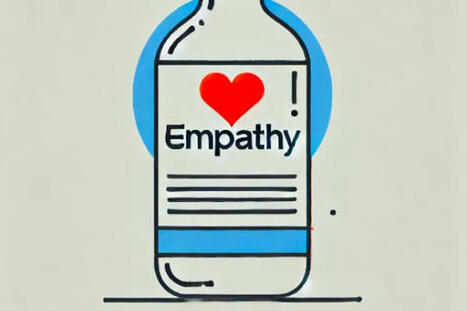


 Your new post is loading...
Your new post is loading...
